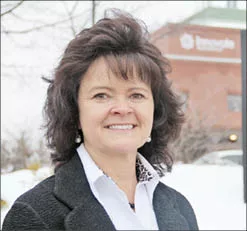Innovate Washington is ready to grow
Technology-focused economic development group to bolster staff, develop energy hub

Quietly operating for a year and a half as a statewide technology-related economic development agency, Innovate Washington expects to make more noise in the coming year.
As it does so, Innovate Washington CEO Kim Zentz says, the organization's focus is on bolstering a cluster of sectors statewide, rather than attracting businesses to a specific geographic region within the state.
"We're putting a strong emphasis on telling the story of innovation in Washington state," she says.
Innovate Washington is the end product of the merger of Seattle-based Washington Technology Center and Spokane-based Sirti, which occurred Aug. 1, 2011. The organization continues to have a presence in both markets, as well as in the Tri-Cities and in Vancouver, Wash. The business sectors in which it's promoting economic development are aerospace, clean energy, agriculture, life sciences, information technology, and advanced materials and manufacturing.
As part of that statewide focus, Innovate Washington is hiring employees where it finds the talent it needs, Zentz says. For examples, she is based in Spokane, but the organization's Chief Financial Officer and Chief Operating Officer Chris Coleman is based in Seattle. In all, the organization currently has 15 employees: eight in Spokane, five in Seattle, one in the Tri-Cities, and one in Vancouver.
Zentz says the organization plans to add seven more people by August. In Spokane last week, Innovate Washington hired Nancy McDaniel, a 25-year banking veteran, as an executive entrepreneur in its accelerated services group, who will advise the organization on development of its loan and capital funding programs.
Zentz says the organization currently has job offers extended to a few professionals in the Seattle market as well.
The organization's first major physical effort is a $12.3 million Northwest Building Energy Technology Hub that Innovate Washington plans to develop in Seattle initially, with similar hubs possibly being developed elsewhere in the state in the future.
Zentz says the organization hopes to identify a location in Seattle for the energy technology hub soon and to open it late this year.
Such hubs, she says, are expected to create a network of building-efficiency demonstration sites around the state and to become clearinghouses for data collection related to building efficiency. Ultimately, she says, such hubs could showcase endeavors in the state focused on energy innovation.
One component of that will be that the hub will show the status of technologies and programs being tested at sites around the Pacific Northwest, including work occurring at McKinstry Co. test facilities.
The development of the first energy technology hub comes after the U.S. Department of Commerce awarded a $1 million i6 Green Challenge grant to Innovate Washington. The organization secured an additional $10 million—$5 million from Washington state and another $5 million from the Northwest Energy Efficiency Alliance—and more money from others while pursuing the grant.
Zentz says the ability to put together a statewide proposal and leverage additional funds for the project helped the organization land the federal money.
"We wouldn't have the i6 grant if we didn't have the state ready to invest in a catalytic way," she says.
Competing nationally for grant funds, company relocations, and other tech-related economic development endeavors should work better than in the past, Zentz says, when multiple agencies within the state would compete against each other.
"What we found was that it was fragmented," she says. "Everybody was inadvertently playing small ball. We weren't moving the needle."
Innovate Washington recently completed its first five-year business plan that's intended to help guide the organization through 2017. In that plan, the organization lists four goals: attract and achieve greater economic impact from non-state research-and-development dollars; increase the capital efficiency and expand market access of small- and medium-sized companies; advocate for predicable policy and regulatory environment to encourage investment in Washington operations; and try to maximize use of existing efforts while avoiding the temptation to start new programs.
Looking ahead, Zentz says Innovate Washington won't play the same role in business incubation as Sirti played in its final years. Even before the merger, she says, Sirti didn't use the word "incubator" in describing its work with young companies, adding that the term typically refers to companies smaller and not as far along as the ones the organizations assists.
In general, Zentz says she expects Innovate Washington to be working with fewer companies, but for those companies to be farther along in their development than a startup. Also, she says she expects the organization to be more deeply engaged with the companies it's working with than it has been in the past, in an effort to help them develop more quickly.
"We're focused more on acceleration than incubation," she says.
Ultimately, Innovate Washington will be looking at hard metrics that gauge its performance, one of the most important, she says, being job creation.
"Creating jobs is one of the unifying factors around our fractured political system," Zentz says.
Related Articles


_c.webp?t=1763626051)

_web.webp?t=1764835652)
